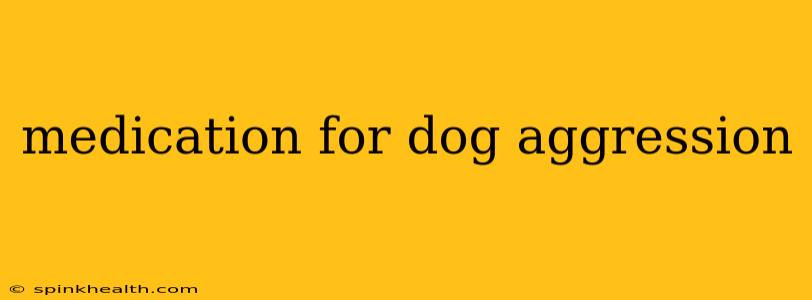Dog aggression. The words themselves can fill a dog owner with dread. Witnessing your beloved canine lash out, whether it's a sudden snap, a persistent growl, or a full-blown attack, is heartbreaking and terrifying. If you're here, you're likely searching for solutions, and medication is often a significant part of the conversation. Let's delve into this complex topic, understanding that this isn't a simple fix, and a holistic approach is always best.
This isn't a substitute for professional veterinary advice. Always consult your veterinarian before starting any medication regimen for your dog. They can properly diagnose the underlying cause of the aggression and recommend the best course of action.
What Causes Dog Aggression?
Before we talk about medication, it's crucial to understand the why behind the aggression. Aggression isn't a single diagnosis; it's a symptom of an underlying issue. Some common causes include:
- Fear-based aggression: A dog feeling threatened or scared might react aggressively as a defense mechanism.
- Territorial aggression: Protecting their home, food, toys, or even people they perceive as "theirs" can trigger aggressive behavior.
- Possessive aggression: Similar to territorial aggression, this involves guarding resources.
- Dominance aggression (controversial): This theory is less widely accepted now, often being a misinterpretation of other underlying issues.
- Pain-related aggression: A dog in pain might snap or bite when touched or approached.
- Redirected aggression: Frustration or excitement can be redirected onto a nearby target.
- Maternal aggression: Protective mothers can be aggressive towards perceived threats to their puppies.
- Inter-dog aggression: Aggression directed at other dogs.
What Medications are Used to Treat Dog Aggression?
Several medications can help manage dog aggression, but they work differently and have different side effects. Your vet will consider your dog's breed, age, health history, and the specific type of aggression when making a recommendation. Common types include:
- Anti-anxiety medications: These aim to reduce anxiety and fear, which often underlie aggression. Examples include clomipramine (Clomicalm), fluoxetine (Prozac), sertraline (Zoloft), and paroxetine (Paxil). These are often SSRIs (Selective Serotonin Reuptake Inhibitors) or SNRIs (Serotonin-Norepinephrine Reuptake Inhibitors).
- Antidepressants: These can help regulate mood and reduce impulsive behavior.
- Trazodone: Often used for short-term anxiety relief or to help with sleep.
How Long Does it Take for Medication to Work?
It takes time for medication to become fully effective. You may not see significant changes immediately. It could take several weeks, or even months, before you notice a reduction in aggressive behavior. Patience and consistent administration are key.
What are the Side Effects of Medication for Dog Aggression?
Side effects vary depending on the medication and your dog's individual sensitivity. Some common potential side effects include:
- Gastrointestinal issues: Vomiting, diarrhea, loss of appetite
- Sedation or lethargy: Your dog might become sleepy or less energetic.
- Changes in appetite: Increased or decreased appetite
- Weight changes: Weight gain or loss
Is Medication the Only Treatment for Dog Aggression?
No. Medication is often a part of a broader treatment plan, not the sole solution. Behavioral modification, training, and environmental adjustments are just as crucial. A certified veterinary behaviorist or a professional dog trainer can provide personalized guidance on these aspects.
What About Natural Remedies for Dog Aggression?
While some supplements and calming aids are marketed for aggression, scientific evidence supporting their effectiveness is often limited. Always discuss any supplements with your vet before giving them to your dog, as they can interact with medications.
When Should I Consider Medication for My Dog's Aggression?
If your dog's aggression is causing significant distress to you, your family, or others, and behavior modification alone isn't effective, medication might be a necessary component of the treatment plan.
Remember, treating dog aggression is a journey, not a sprint. A collaborative approach with your veterinarian, a certified professional dog trainer, and possibly a veterinary behaviorist is essential for the best possible outcome for both you and your dog. Patience, consistency, and a holistic strategy are vital for success.

